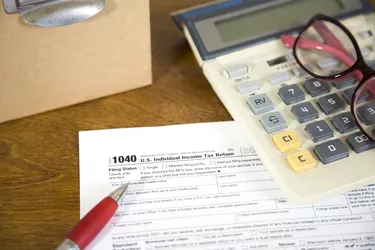
Based on recent changes to the tax code, many Americans are wondering who qualifies as a dependent for taxes. In many family situations, children and elderly parents or grandparents are dependent upon working-age taxpayers to provide them with financial support.
The IRS says that taxpayers can take an exemption of $500 for each non-child dependent that they have. For a grandparent to meet the qualifying relative deduction, he or she must meet certain guidelines set forth by the IRS. The credit begins to phase out when the taxpayer earns $200,000 or more, according to the IRS.
Video of the Day
Video of the Day
Consider Also: Claiming Dependents for Your Taxes
Qualifying Children and Relatives
The IRS recognizes two types of dependents: qualifying children and qualifying relatives. The IRS says that a qualifying child must be less than 19 years of age or younger than 24 if he is a full-time student, but there is no age requirement for qualifying relatives.
This means that a grandparent can potentially be considered a dependent as a qualifying relative, but not as a qualifying child. Be careful that you and a divorced partner don't both claim any children or relatives as dependents if you are.
Only one partner can claim head of household after a divorce, and specific children as dependents. That's because to claim children as dependents, you must pay more than 50 percent of their expenses. This prevents divorced parents from each claiming they pay 50 percent support and trying to each claim the tax credits.
Consider Also: Child Tax Credit: What Is It & How to Qualify
Member of Household or Relationship Test
The IRS states that a qualifying relative must either live with you all year as a member of your household or be related to you in one of several ways to qualify as a dependent. Relatives do not have to live with you all year to be qualifying relatives include grandparents, parents and or other direct ancestors, like great grandparents. A grandmother can be claimed as a dependent even if she didn't live with you all year, so long as she meets the gross income and support requirements for qualifying relatives.
Consider Also: What's Different About the 2021 Child Tax Credit?
Gross Income Requirement
For tax year 2021, a qualifying relative must have a gross income that is less than $4,300, explains the IRS. Retired grandparents who have no regular source of income are likely to meet this requirement. According to the IRS, tax-exempt income, like certain Social Security benefits, does not have to be included in gross income; so, a grandparent may qualify as a dependent even if she receives more than $4,300 a year from Social Security.
Support Requirements for Dependents
The final criterion for determining whether a person is a qualifying relative is the amount of support the taxpayer provided to the relative. The IRS says that a taxpayer must have provided more than half of another person's support during a calendar year for that person to be considered a qualifying relative. If a grandparent used her own savings or income to pay for at least half of her own support, she does not qualify as a dependent.